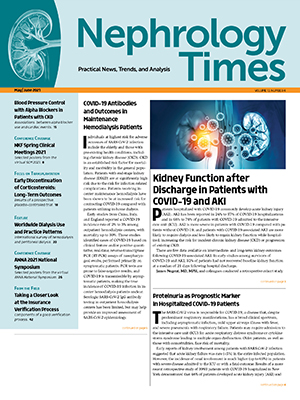
Chronic kidney disease (CKD) affects 15% of adults in the United States and is the 9th leading cause of death. Results of studies conducted over the past 20 years have revealed an uneven burden of CKD and identified disparities in the incidence and outcomes of CKD, with minorities being at highest risk. Social determinants are increasingly being shown as explanations for those disparities.
The World Health Organization defines social determinants as “conditions in which people are born, grow, work, live, and age.” Social determinants have been categorized into four groups of interacting factors: (1) socioeconomic circumstances; (2) psychosocial factors; (3) neighborhood environment; and (4) political, economic, and cultural factors (e.g., food insecurity, housing instability, social support, and violence in one’s community).
Recent studies have shown associations between socioeconomic status (poverty) and CKD risk factors, CKD progression, incident end-stage kidney disease, and mortality. There are few data available on the cumulative effects of social determinants of health factors on health outcomes in individuals with CKD with or without diabetes. Mukoso N. Ozieh, MD, and colleagues conducted a study to define the cumulative and individual association between social determinants of health and mortality in that patient population. Results of the study were reported in BMC Nephrology [doi.org/10.1186/s12882-021-02277-2.
The researchers utilized data from National Health and Nutrition Examination Surveys (2005-2014) for 1376 adults ≥20 years of age (representing 7,579,967 US adults) with CKD and diabetes. The outcome of interest was all-cause mortality.
Diabetes was defined as self-reported diabetes, or a hemoglobin A1c (HbA1c) ≥6.5% per 2016 American Diabetes Association guidelines. CKD was defined based on estimated glomerular filtration rate (eGFR) categories (G1-G5) and albuminuria/urine albumin-to-creatinine ratio categories (A1-A3) according to the Kidney Disease Improving Global Outcomes Clinical Practice Guidelines for the Evaluation and Management of Chronic Kidney Disease.
Social determinants of health measures included family income to poverty ratio level, household food insecurity, and depression. Demographic variables included sex, age, race-ethnicity (non-Hispanic White, non-Hispanic Black, Hispanic, and other minority), education level, and insurance coverage (dichotomized as yes vs no). Lifestyle variables included physical activity (no physical activity vs moderate to vigorous physical activity), smoking status (never smoker vs former or current smoker), and drinking status (none drinker vs moderate or above moderate drinker), Glycemic control measures using HbA1c level was included as a continuous variable based on every 1% increase in HbA1c level. Comorbidities were defined as the presence or absence of cancer, hypertension, heart disease, and stroke.
Mean age of the sample was 63.5 years, 30.6% reported poverty, 16.1% reported food insecurity, 32.6% reported depression, and 53.4% reported the presence of any adverse social determinants. The majority of the sample was non-Hispanic White (63.2%) and had insurance coverage (89.5%).
Prior to adjustment, the association between a cumulative social determinants of health score and mortality was not statistically significant (hazard ratio [HR], 1.11; 95% confidence interval [CI], 0.97-1.28). Following adjustment for demographics, the adjusted HR reached statistical significance (1.41; 95% CI, 1.18-1.67). The association remained significant following the addition of lifestyle variables, glycemic control and comorbidities (HR, 1.41; 95% CI, 1.18-1.68) for every 1 score increase in the cumulative social determinant scale. In the fully adjusted model examining the association between the dichotomous social determinants and mortality, results were similar, indicating a significant association between the presence of any adverse social determinants of health factor and mortality (HR, 1.41; 95% CI, 1.08-1.84).
In analyses incorporating all three social determinants of health measures as individual factors (family income to poverty ratio level, household food insecurity, and depression), prior to adjustment, when the three variables were entered into the same model, only depression had a statistically significant association with mortality (depression, HR, 1.33; 95% CI, 1.04-1.71). Following adjustment for demographics, lifestyle variables, glycemic control and comorbidities, depression (HR, 1.41; 95% CI, 1.10-1.82) maintained statistical significance. There was an independent association between depression and mortality. There was no independent association between either food insecurity (HR, 1.41; 95% CI, 0.95-2.07; P=.09) or poverty (HR, 1.40; 95% CI, 1.00-1.97) and mortality.
Limitations to the study cited by the authors included the cross-sectional design that precluded an analysis of causality, the lack of control for medication use, and the inability to completely rule out the possibility of residual confounding.
The researchers said, “In conclusion, in a national sample of adults with CKD and diabetes, we found that every unit increase in cumulative social determinant of heath score was associated with increased mortality. We also found that particular social determinant of health factors, such as depression, are independently associated with mortality in this population. These findings suggest that interventions are needed to address social determinant factors in individuals with CKD and diabetes.
Takeaway Points
- Researchers conducted a study to examine the cumulative impact of social determinants of health on mortality in a population of US adults with chronic kidney disease (CKD) and diabetes.
- Social determinants include factors such as family income to poverty ratio level, food insecurity, and depression.
- Following adjustment for covariates, there was a significant and independent association between depression and mortality; associations of poverty and food insecurity with mortality were not statistically significant.







 © 2025 Mashup Media, LLC, a Formedics Property. All Rights Reserved.
© 2025 Mashup Media, LLC, a Formedics Property. All Rights Reserved.